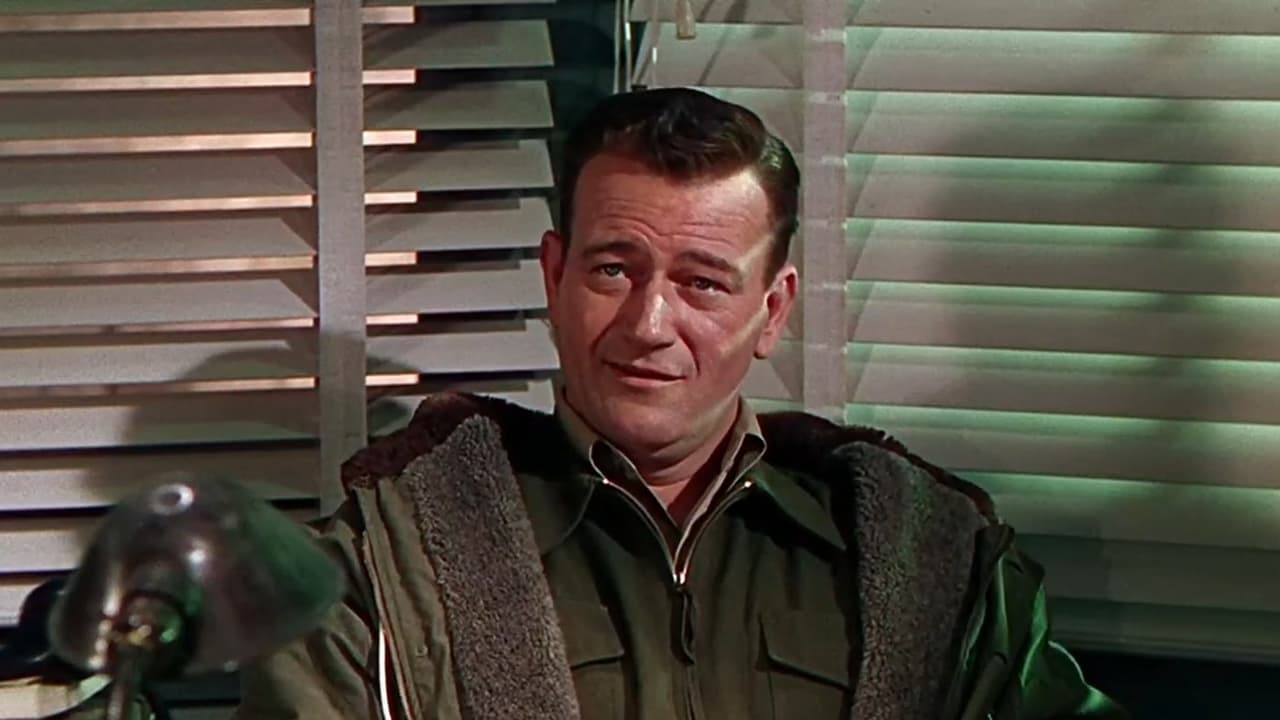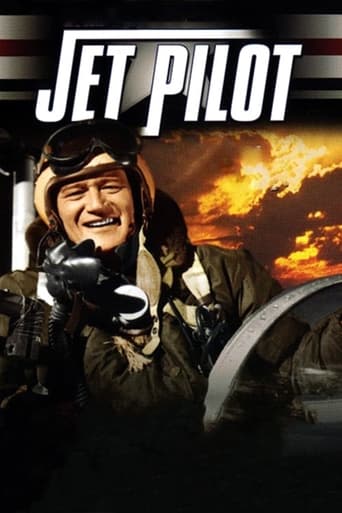



Sadly Over-hyped
A Brilliant Conflict
Not sure how, but this is easily one of the best movies all summer. Multiple levels of funny, never takes itself seriously, super colorful, and creative.
View MoreWorth seeing just to witness how winsome it is.
There are those who would speak of this film in the same breath as 'The Conqueror'. I disagree, this is a much better movie than that; just endlessly meddled with and released too late for the film's 'hooks' to be relevant back in the day; the aircraft were out of date and US-Soviet relations had noticeably deteriorated in the meantime. Gorgeous though she is, Leigh is about as convincing a Russian thing as a slice of apple pie would be, and John Wayne is, well, John Wayne, i.e. a bit wooden whenever he isn't sat on a horse, pretty much.However, looking at it fifty or sixty years later, none of that matters; there are those who would argue that a 'bad film' that happens to have John Wayne and Janet Leigh in it is actually a 'good film' in the grand scheme of things. Even if you are not big on either lead, it is still an interesting period piece and has enough amusing/interesting moments (just) to make it watchable in it's own right.For example, I never knew that a jet plane could wolf-whistle before, but that is the way it is dubbed in the scene where Leigh disrobes whilst being 'searched' early in the film.Aviation enthusiasts will doubtless be interested to see the period aircraft; F-86A Sabres, Boeing B50, Bell X-1 (last flight ever), Convair B36, Lockheed F94 Starfire, Lockheed T33 Shooting Star, Northrop F-89 Scorpions all make an appearance, some painted to more closely resemble Soviet types.Sure, the plot is nonsense, and asides from the aerial sequences, the production values are nothing to get excited about. But this film is still worth watching, even if all it does is give rise to dumb questions like 'who gave her a pearl necklace, anyway...?' ...who wouldn't have...?
View MoreIts difficult to believe that Josef Von Sternberg, the great master of atmospheric romances, the man who helmed Marlene Dietrich through all her great early 1930s films--The Blue Angel, Morocco and Shanghai Express--was supposed to have been around to direct this shambles; while fans of John Wayne who will accept almost anything The Duke appeared in may be pleased to see him outwit Russian spy Janet Leigh in really impressive Technicolor, and may be happy to see the incredibly grand jet fighter footage probably provided courtesy of Howard Hughes, those of us who want a little believability with our tales may find it difficult to accept Janet Leigh as a Russian spy with perfect Hollywood articulation, especially when wrapped up in some maroon and gold sparkly drag from what might be an old Maria Montez jungle epic; the best Russian vs. American conflict remains Garbo vs. Douglas in Ninotcha, with scintillating dialogue and brilliant repartee. This doesn't even come close to that witty classic; it's mostly silly mock-heroic stuff that does go on and on. On the plus side, the aerial footage, the spectacular shots of jets in the clouds can be breathtaking, and are almost worth the nearly two hour running time
View MoreOnce he ended his professional relationship with Paramount and Marlene Dietrich, Josef von Sternberg was unable to develop projects. A confessed admirer of everything Japanese, he made a trip in 1936 to Tokyo where he discussed the possibility of a new film, impeded by the next world war; he did not finish a version of "I, Claudius" that he had started in 1937 in London; and in the next decade he could only make "The Shanghai Gesture" (1941), a film that enjoys today a deserved cult following, and a short for the U.S. government, "The Town". Then in the 1950s he directed his last three films, two of which brought him new problems with the studios, where he had no control of what he shot, unlike his final work, "The Saga of Anatahan". In the other two films, "Jet Pilot" and "Macao", made for RKO, its owner, Howard Hughes, hampered the creative process, as usual. As "Trivia" tell us, due to his interest in aviation Hughes also wanted to produce a show of the latest advances in aeronautical technology, but when the film was released the planes on the screen were old fashioned (only experts can tell this, for me they seem war airplanes all the same). Sternberg's Hughesian hell began with "Jet Pilot", which was supposedly finished in 1950. But Hughes continued making changes until 1953, and the film was released in 1957. By then Hughes had sold RKO, but he had had enough time to change it to his liking. Written by Jules Furthman, "Jet Pilot" is a cross between a screwball comedy and one of those Cold War atrocities dealing with the fear to the "Red Menace": the communist Soviet Union. The anti-Soviet barrage was frequently more stupid than brilliant and if it came from American minds, hands or mouths, the result was worst (than the funny satires of Don Camillo, for example). The vociferous jingoism and proto-Fascist patriotism was disguised as chic efficacy, "democracy" and a few more idiocies. Right-wing to the bone, John Wayne enjoyed every minute of it and it shows, but at least it is nice to see him laugh for a change, while he falls for a pilot (Janet Leigh) who has defected from the USSR. She turns out to be a spy, but everything will turn out well, as in a not too distant Doris Day vehicle. In the last shot there is a memorable line of dumb dialog when, while she eats a beefsteak, Janet tells John that all she wanted to communicate to her fellow Russians is that "not everything is war". Sure, it is also beef, but the one who wrote it forgot about Hiroshima. Maybe as a prize, Hughes let Furthman (who wrote the line) direct a few additional scenes, as he and others did to no avail.
View MoreLike one of the others who have commented here, I just saw this film for the first time, despite the many years since its release.My all-time favorite of a flick which rates a solid 10-stars for its awful, bizarre weirdness, is the Bruce Jenner/Village People picture, "Can't Stop the Music" - however, this one is a VERY close contender.There are several comments which depict the "plot" at length, so I'll simply outline the ending. To conform to the site's caveat regarding spoilers, I've indicated same - but there is little here actually to "spoil," since suspense and plot revelation are hardly among its components.Janet Leigh is about as believable as a Russian air officer and pilot as, say, Yakov Smirnoff attempting to play Jed or Jethro in a "Beverly Hillbillies" remake.Big John, hardly a Gielgud or Olivier at his most serious, has his tongue so far in his cheek here, that he is in danger of severe jaw damage. But this is all accomplished in a surprisingly effective, amusing manner, as the title figure "ace," and Leigh's American love interest.The climax of the film pretty well sums things up. In separate jets, Leigh and Wayne have landed at a Russian base. John runs from his plane to Janet's, hops in and she takes off. All of this is accomplished amidst a hail of bullets from the Russian soldiers on the base. Naturally, they don't hit anything.Janet takes-off, and they are pursued by a horde of Russian jets (they are fleeing to Vienna!). She actually asks Big John what she should do. Honestly, again...honestly!!! ------------HE TELLS HER TO "TURN RIGHT!!!"Well, this apparently works, because in the next scene they are at dinner, presumably in Vienna, and Janet is enjoying immensely her steak, the size of one Hoss might enjoy on "Bonanza."She then says something about how she'd like for the folks in her country (remember, she's a 1950's, Cold War-period Russkie) to become more interested in these (i.e. steaks) than guns.Immediately after this sage comment, Big John leans toward her and plants a kiss as the film ends.Movies can't be much more fun than this.
View More